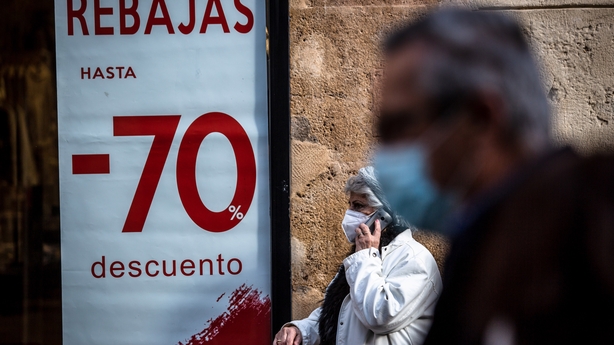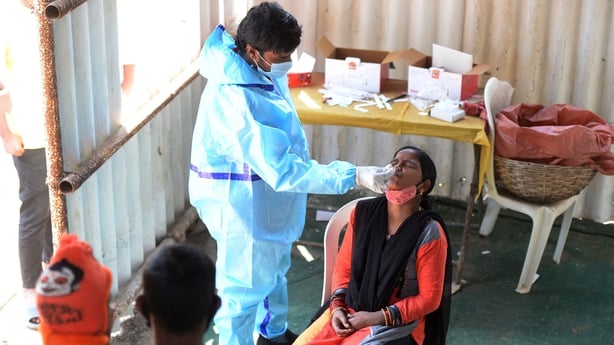Austria's president has signed a law making Covid-19 vaccination mandatory for all adults, a first in the European Union.
It applies to all adults, except pregnant women and those with a medical exemption. Those holding out can face fines of up to €3,600 after mid-March following an "introductory phase".
President Alexander Van der Bellen signed the law after parliament approved it, his office said. It is expected to take effect from Sunday, a day after it has been officially published.
Tens of thousands have demonstrated against mandatory vaccination in regular weekend rallies since the measure was announced in November.
But it has broad political support - with all parties except the far-right rallying behind it - in a bid to drive up the country's vaccination rate.
Currently, 69% of Austrian residents have certificates that they are fully protected against the coronavirus - including a booster for those whose shots were more than six months ago.
Austria has to date seen more than 14,000 Covid-related deaths and close to two million cases in a population of nine million.
As elsewhere, Omicron has sent cases spiralling in recent weeks, but hospitals have not been overwhelmed so far.
Compulsory vaccinations against Covid are rare though Ecuador, Tajikistan, Turkmenistan, Indonesia and Micronesia have introduced such schemes.
Spain to scrap mandatory outdoor masks next week

The Spanish government will lift the requirement for people to wear masks outdoors from next Thursday, Health Minister Carolina Darias has said.
The measure was reinstated in late December to curb the spread of the Omicron variant.
The cabinet plans to approve the change at its weekly meeting scheduled for Tuesday and make it effective two days later, Ms Darias told La SER radio station.
The government "always said it would last only while it was strictly necessary," she said. As contagion rates have fallen for several days, the government considers situation has changed, she said.
In the past two weeks, the incidence rate for Covid-19 has been steadily falling to 2,421 cases per 100,000 people yesterday, down from almost 3,400 in early January.
Despite the surge in cases between November and January as Omicron spread, hospital admissions and deaths remain well below those seen in earlier waves of the pandemic, thanks in large part to Spain's high vaccination rate.
Spain's total death toll from the pandemic stands at 94,040 and the number of cases at 10.2 million.
In recent weeks, many of Spain's regions have moved to ease restrictions that were tightened in the face of Omicron, with the northeastern Catalonia region dropping as ineffective the requirement to show a Covid passport to enter restaurants, bars and gyms.
The region has also dropped a nighttime curfew along with capacity restrictions in bars and restaurants, and will reopen its nightlife venues on 11 February.
Several European countries, including Ireland, have also started to roll back Covid-related restrictions.
Outdoor masks are no longer mandatory in France and Italy's government announced on Wednesday it would release a timetable for a restriction phaseout.
India's official Covid death toll passes 500,000
India's official Covid-19 death toll has crossed 500,000, a level some data analysts said was breached last year but was obscured by inaccurate surveys and unaccounted dead in the hinterlands, where millions remain vulnerable to the disease.
The country, which has the fourth-highest tally of deaths globally, recorded 400,000 deaths by July 2021 after the devastating outbreak from the Delta variant, according to official data. Some believe the figures were much higher.
"Our study published in the journal Science estimates 3 million Covid deaths in India until mid-2021 using three different databases," Chinmay Tumbe, an assistant professor at the Indian Institute of Management, Ahmedabad, who co-authored the study, said.

Last month, the Indian government dismissed the study as baseless in a notification saying there is a robust system of birth and death reporting.
India's states record deaths from Covid after collating data from their districts. In the last few months, several states have updated the number of deaths, some under pressure from the country's top court. In most instances, authorities said there were lapses due to delayed registrations and other administrative errors.
India is currently in the midst of a third wave of the coronavirus led by the Omicron variant, which some top experts say is already in community transmission although federal officials say most cases are mild.
Last month, the government eased testing norms and told states to drop mandatory testing for contacts of confirmed cases unless they were old or battling other conditions. But, with the number of tests falling, the government issued a revised circular warning states they would miss the spread of the virus.
According to official figures, India's overall number of Covid infections has reached 41.95 million, the second-highest globally behind the United States.
To prevent new surges, the government has vaccinated three-fourths of the eligible 939 million adult population with the mandatory two-dose regime.
In the country's capital Delhi, as new infections of the Omicron variant fell sharply off the peak, authorities further eased curbs and said they will allow schools and colleges tor eopen from Monday, and permit private offices to be fully staffed.
The city's sports complexes will also reopen.

